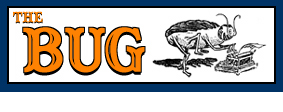Like any budding artisan, Omar Ansari spoke with great pride when he offered a visitor a taste of his creation. “Try that,” he said, pulling a shot of Furious Ale from one of the giant stainless steel tanks. “What do you think?” I think the Surly Brewing Company, the Twin Cities’ newest producer of craft beer, is on to something. Its name derives from the notion that one becomes surly when offered a mediocre beer. Furious Ale is a beaut: With each sip your tongue is greeted with a sweet malt flavor that is almost immediately chased by an astringent hoppiness, which lingers like a pleasant daydream. When asked if he thinks there’s a market around here for yet another microbrew, Ansari answered without hesitation: “Oh, we can always use more beer!”
Thanks in part to his shoulder-length black hair, Ansari has the soft, friendly look of a surfer who’s finally settled down. He often said things like, “Let’s see, Sam was four months old when I had the idea, and two and a half when I bought this place … ”—one of many instances in which he used the age of his children as a timeline. Ansari’s story is essentially the same as many other specialty brewers: He received a homebrew kit as a gift one Christmas and over the next ten years saw his hobby turn into a roaring obsession, which eventually morphed into a business plan. “You know what they say,” Ansari said, “Give a man a beer, he’ll waste an hour. Teach him to brew, he’ll waste a lifetime.”
The Surly Brewing Company is located in a nondescript little concrete block building in Brooklyn Center. (It is unaffiliated with Surly Bikes, in Bloomington—though they are mutual admirers.) From the outside, the place looks like just another bunker in a beleaguered temp-worker wasteland. The Surly headquarters features a wall of multicolored graffiti, a potholed parking lot, and bland, fading signage for the Ansari family business, Sparky Abrasives, which shares the space with the new brewery.
Once inside, however, you’re greeted with what will eventually be the bar and tasting area, where the glow of a neon Surly beer sign shines off the new linoleum tiles in gold and crimson, the brewery’s colors. Back in what used to be a large, long storage room are rows of stainless steel vats, copper piping and big yellow signs warning of the presence of acid. On one wall a shelf of five- and fifteen-gallon kegs rises to the ceiling. Toolboxes and welding equipment are scattered about, along with an old whiskey barrel (for future cask-aged ales) and, languishing in a corner, Ansari’s old homebrewing supplies, a pile of plastic pipes and tubs.
Ansari negotiated this mess like a seasoned pro as we spoke. As one might expect, starting a brewery wasn’t easy. “The biggest, and most surprising, difficulty was trying to find all this equipment,” Ansari explained, gesturing around the room. Apparently, given the prohibitive expense, few microbrewers can afford to buy their equipment new. Small breweries come and go, however, and when they go, upstarts like Surly can acquire pretty much everything they need—from brew kettles to fermenters—secondhand.
One of Ansari’s associates eventually discovered a defunct brewery in the Dominican Republic. Apparently, the machinery was originally sold to the second-richest guy on the island, who tried to set up his son in business. This enterprise failed in short order, and Surly bought the works and hauled it all up to Brooklyn Center.
Before he could start brewing, Ansari also had to arrange a change in the city’s laws. Since the 1950s an ordinance had been on the books that prohibited brewery operations within the city limits. That made sense sixty years ago, when a brewery typically produced millions of barrels a year, sucked water by the trainload, and belched enough sewage to fill a small lake. In those days, of course, there was no such thing as a microbrewery. After a pleasant meeting with local commissioners—one of whom was a homebrewer himself—the law was changed to accommodate Surly.
Todd Haug is Ansari’s head brewer. He is a short, taciturn man, with more than a dozen years of brewing experience. When asked where his recipes came from, he shrugged and pointed at his noggin. “Made it up in my head,” he said. Not only is Haug responsible for making sure the beer is of the finest quality, he is also Surly’s mechanical man, and welded and assembled most of the brewery’s machinery. “My hobbies are welding and fabricating,” he mumbled before disappearing behind the pipes and giant silver barrels. Ansari rolled his eyes and said, “I was told that if you ever find a brewer who’s also into welding, never let him go. I’ll never let him go!”
For now, Surly will brew only two beers, and focus entirely on kegs (bottling would take up a tremendous amount of space). Ansari will use his big red truck to distribute the brew himself. A few restaurants and bars are already serving his beers, but he admits that it takes time to get tavern owners to agree to something they haven’t yet tasted. Without much of a staff besides himself and Haug, Ansari will hit the pavement, meeting tavern owners and plugging his product. “This is the best way to be a salesman,” he adds with a grin. “I’m not selling widgets, you know. I’m selling something people really care about, something I care about. It’s not like before. No one cares about abrasives. But people love beer!”
This article originally appeared in The Rake magazine.
